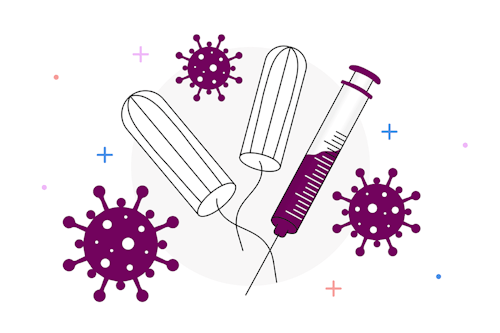- The number of days with heavy menstrual bleeding did not change after vaccination
- Those who were vaccinated were about 4% more likely to have an increased total amount of bleeding in the cycle following vaccination
- The change in bleeding amount went away after one cycle
Since the COVID vaccines became available, there have been many reports from the general public about changes to the menstrual cycle following vaccination. In previous studies, the Natural Cycles research team was able to find a small but temporary increase in cycle length after vaccination that went away in the following cycles. Our studies have also shown that period length was not affected by vaccination.
There are more aspects of the menstrual cycle to look into and in this study, we wanted to investigate if the COVID vaccines affect how much you bleed during your period.
In the Natural Cycles app, users are able to log their period flow (light, medium, or heavy) as well as any spotting they may experience during their cycle. We encouraged users to log when they had their COVID vaccination and which vaccine brand they got.
In this study, we analyzed period data from 9,555 Natural Cycles users (7,401 of which were vaccinated and 2,154 who were not vaccinated). We looked at both the number of days with heavy bleeding and the total amount of bleeding during each period. This was to help us see if there was any difference between the two groups caused by the vaccinations.
When looking at the total amount of period bleeding, we found that those who were vaccinated were about 4% more likely to experience a larger amount of bleeding during the period after the first and second vaccine doses compared to the unvaccinated group. This change then went away in the following cycle, similar to what has previously been found for other cycle changes after vaccination.
The results also showed that the number of days with heavy bleeding was not affected by vaccination.
This study adds to the growing body of research showing that small changes to the menstrual cycle can happen after taking the COVID vaccines, but that these changes tend to be temporary and go away in the next few cycles. However, even though the changes are small and temporary for most people, some do experience larger changes to their cycle so if you feel concerned for any reason, you should reach out to your healthcare provider.
This study, and others like it, highlight the importance of monitoring menstrual health when introducing vaccines and other treatments into healthcare settings.
